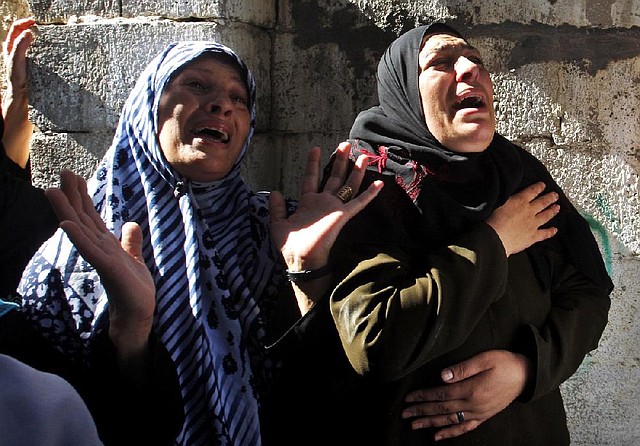Egyptians call Israeli airstrikes political posturing
Palestinian women react during the funeral of Hamas militant Mohammed Al Qanoah in Gaza City on Tuesday. A Palestinian health official said Al Qanoah died of wounds received in an Israeli airstrike Saturday.
Wednesday, November 14, 2012
CAIRO — Egypt’s powerful Muslim Brotherhood sharply criticized Israeli leaders Tuesday over airstrikes in the Gaza Strip, accusing them of heating up the conflict to score political points ahead of elections.
The latest round of violence began Saturday, with rocket attacks from Gaza militants and Israeli airstrikes that killed seven Palestinians. More than 100 rockets have exploded in Israel since the weekend. The exchanges appeared to die down Tuesday.
Also, Israeli tanks struck a Syrian artillery launcher Monday after a mortar shell flew into Israel-held territory, fueling concerns that Israel could be dragged into the Syrian civil war.
In its statement, the Brotherhood’s Freedom and Justice Party referred to Israel as a “Zionist occupier” and a “racist state,” placing Israeli Prime Minister Benjamin Netanyahu and Foreign Minister Avigdor Lieberman on the “fringes” of the “far right.”
“In the framework of elections that Israel is witnessing is a recent military escalation against occupied Gaza and the occupied Golan Heights,” the statement said. Israel has set parliamentary elections for Jan. 22.
The Brotherhood’s party called on Arab and Muslim governments “to stop the Zionist war that is operating under electoral calculations for personal gain far from humanitarian calculations for peace, security and stability.”
The Muslim Brotherhood itself released a separate statement shortly after its party’s, sharpening the criticism by accusing Israel of following a policy that tries to appear opposite of itself and saying “God knows they are liars.”
“The killing of tens of our innocent Palestinian brothers is part of a link in a chain of oppression and Judaization that seeks to impose itself on the ground, and that will never materialize with God’s will,” it said.
The harsh pronouncements followed a small demonstration in Cairo on Monday and the signing of an open letter by several liberal parties and revolutionary groups denouncing the Israeli strikes on Gaza.
The statements by both the Brotherhood and its political party highlight decades of tensions between neighbors Israel and Egypt, despite a 1979 peace treaty. The Islamists, repressed in Egypt under the regime that was ousted last year, have emerged as the most powerful group since last year’s popular uprising. They won parliamentary elections and the presidency.
Last month, the group’s supreme leader, Mohammed Badie, released a fiery tirade against Jews, accusing them of spreading corruption, slaughtering Muslims and desecrating holy sites. The comments were denounced by Israeli officials and a leading anti-Semitic group.
Unlike his predecessor, the ousted Hosni Mubarak, President Mohammed Morsi has not met Israeli officials since his election in June. He has also not mentioned Israel by name in official statements, in line with long-standing Brotherhood policy.
But to secure investments and bolster the economy, Morsi recently met with U.S. business executives from top American companies and vowed to respect his country’s peace accord with Israel.
Since his election, Israel and Egypt have quietly cooperated over a military buildup in the Sinai Peninsula, where Islamist militants have been attacking Egyptian forces and launching attacks into Israel. The security coordination signals there is no significant shift in Cairo’s policies toward Israel, despite the heated Brotherhood rhetoric.
Morsi also has indicated there will not be radical changes in policy anytime soon. Hamas, an offshoot of the Muslim Brotherhood movement, rules the Gaza Strip.
Israel withdrew from Gaza in 2005 but controls its airspace, seacoast and most land crossings.
Israel is considering resuming its contentious practice of assassinating militant leaders in Gaza in an effort to halt intensified rocket attacks on Israel’s south, defense officials said.
Advocates have said targeted killings are an effective deterrent without the complications associated with ground operations, chiefly civilian and Israeli troop casualties. Proponents argue that they also prevent future attacks by removing their masterminds.
Critics have said they invite retaliation by militants and encourage them to try to assassinate Israeli leaders.
Defense officials, speaking on condition of anonymity to discuss confidential discussions, said the assassination of Hamas leaders is shaping up as the preferred response to the stepped-up rocket fire.
Meanwhile, defense officials said Tuesday that the Jewish state’s newest missile-defense system, designed to provide another layer of protection against enemy fire, is on schedule for deployment in 2014.
The “David’s Sling” system, named after the famous weapon in the biblical David and Goliath story, is part of a multilayered defense against incoming rockets and missiles. Two of the elements are operational.
Information for this article was contributed by Lauren E. Bohn and Amy Teibel of The Associated Press.
Front Section, Pages 7 on 11/14/2012
